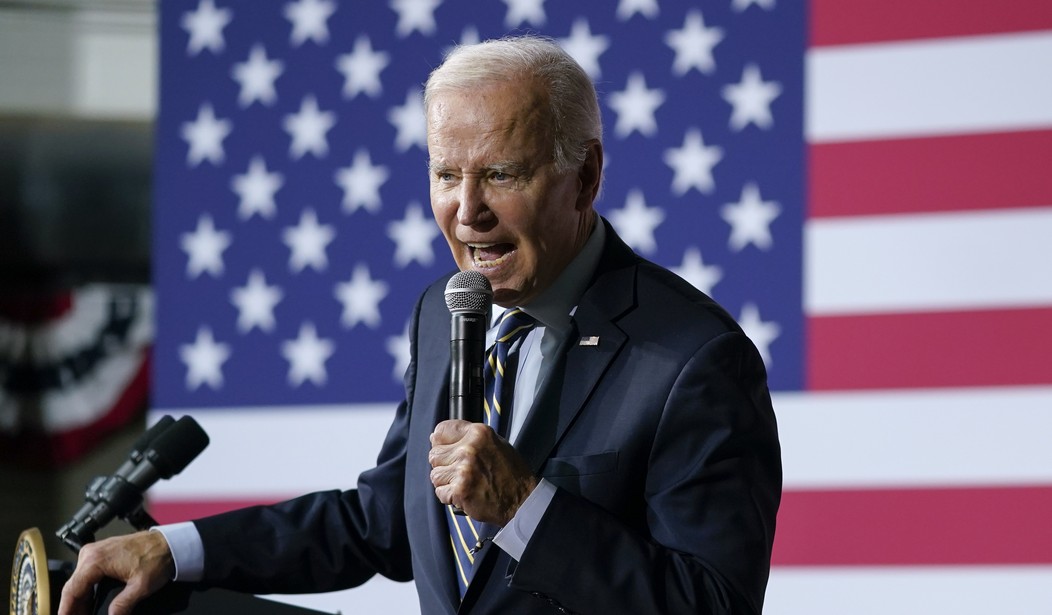It's late April. The unofficial debt limit cutoff is early June, but could arrive a bit sooner than that. For weeks, I've been arguing that a negotiated conclusion will be necessary, and that the White House's demands are untenable and fly in the face of history -- even very recent history, featuring Joe Biden. I've also said repeatedly that from a political standpoint, the Biden administration would be highly incentivized to sit tight and do very little unless and until House Republicans could demonstrate an ability to get on the same page with a unified ask, likely in the form of a bill that passes the lower chamber. Because of the Speaker vote turbulence that everyone witnessed at the beginning of the year, there have been lingering questions about the ability of GOP leadership to corral their own members on high-stakes votes.
Team Biden probably figured that if Republicans ultimately couldn't agree on one debt ceiling plan, resulting in internal squabbling and dysfunction, it would be very easy to engineer a 'blame the GOP' narrative as a partial default loomed. But what if House Republicans march together and pass a bill that would impose relatively modest spending restraint while also increasing the debt limit -- something many observers doubted would be possible? That would show a willingness to govern, it would strengthen Kevin McCarthy's hand, and it would complicate Democrats' turn-key messaging about opposition disarray. Republicans could argue that they've acted legislatively to stave off a catastrophic default, while the president declines to engage in serious, good-faith talks. The Wall Street Journal sets the scene for what could be a consequential vote later this week:
With the health of both the economy and his speakership potentially on the line in the debt-limit fight, Mr. McCarthy and his allies have begun the process of wrangling the 218 votes needed for passage of their plan. In the narrowly divided 222-213 House, Republicans can afford no more than four defections, if all Democrats vote no, as expected. Falling short could badly undermine Republicans in their effort to negotiate a debt-limit compromise with President Biden, who has called for the ceiling to be lifted with no strings attached, and the Democratic-controlled Senate. It also could damage Mr. McCarthy’s credibility within his conference...The Limit, Save, Grow Act would return the government’s discretionary spending to fiscal year 2022 levels, cap annual spending growth at 1% for a decade and raise the debt ceiling until March 31, 2024, or until the national debt increases by $1.5 trillion, whichever comes first. House GOP leaders are planning for a possible vote Wednesday or Thursday, confident that success would strengthen Republicans’ hand and force Mr. Biden to the table. Across the Capitol, Senate Republicans are watching the process closely. They said it is key for House Republicans to demonstrate that they have the votes to pass their debt-ceiling bill.
Recommended
Firebrand Rep. Matt Gaetz, may be a surprisingly easier vote to get when it comes to passing the House Republican plan to raise the debt ceiling...Rather than drag McCarthy down with painstaking internal party battles over the debt ceiling bill, House Republican lawmakers are looking to prop up their leader, get behind the bill and take the spending fight to President Joe Biden at the White House. ... “If you took this plan, and the plan that the House Freedom Caucus laid out some weeks ago, and held them up to a lamp, you would see a lot of alignment,” [Gaetz] said. What seemed almost politically impossible just a few short months ago, when House Republicans were nearly coming to blows on the chamber floor, now appears surprisingly on track as McCarthy pushes, prods and pulls his slim majority to coalesce around a debt ceiling plan...
Senate Majority Leader Chuck Schumer told me that Dems won’t change their posture and continue to demand a clean debt ceiling increase — with no conditions — even if House passes GOP bill.
— Manu Raju (@mkraju) April 20, 2023
“Everything stays the same. No brinksmanship, no hostage taking. Clean. clean. Clean.”
And the White House is already attacking House Republicans' proposal as a "ransom note:"
President Biden is fighting to clean up toxic pollution, lower energy costs, and create clean energy jobs.
— Karine Jean-Pierre (@PressSec) April 22, 2023
MAGA House Republicans are holding our economy hostage with a 320-page ransom note to offshore jobs, fill our cities with smog, and give asthma to our children. pic.twitter.com/0VxB4LNopl
"These MAGA Republicans want to give our children asthma" is a fairly standard piece of Democratic demagoguery these days. They're not sending their best. And even before House Republicans potentially pass their plan, some Democratic members of Congress are already breaking ranks and urging the administration to get serious with negotiations. 'We won't talk' is already becoming inoperative, and this chorus could grow louder if the GOP achieves its task this week:
As House Republicans are teeing up a vote this week on a debt ceiling plan that includes $4.5 trillion in spending cuts, some Democrats in Congress are calling on President Joe Biden to restart negotiations with House Speaker Kevin McCarthy, R-Calif., at least on the federal budget. “He should negotiate on the budget. That is the place to negotiate, and they should start those negotiations now,” Sen. Amy Klobuchar, D-Minn., said on CNN... “Not using the American people and their mortgages as hostage because right now, you’ve gotta simply make clear, we’re gonna avoid default and get this behind us.” ... Klobuchar calling for Biden to negotiate strictly on the budget differs from her colleague, Sen. Joe Manchin, D-W.Va. Manchin applauded McCarthy’s bill last week despite some of his own reservations about the proposed spending cuts. He specifically called on Biden to begin negotiations on the debt limit...As the reality of a potential default nears, some House Democrats have started to publicly urge Biden to restart negotiations with McCarthy. “I don’t think there’s any harm in the two of them sitting down to talk,” Rep. Greg Landsman, D-Ohio., told Politico, condemning “The idea that we’re even coming this close to a potential default." Rep. Debbie Dingell, D-Mich., also told Politico that the White House “can’t keep waiting.”
I'll leave you with this flashback via McCarthy, further undermining the notion that it's somehow reckless and unfathomable to hammer out a legislative compromise in conjunction with a debt limit increase. As we mentioned earlier, Biden was a central figure in the last major round of such talks. And Democrats had their own demands during the last administration:
"Pelosi, the California Democrat, said the idea of raising the debt ceiling on its own and not in conjunction with a budget agreement was not 'acceptable to our caucus' and therefore did not stand a chance of passage in the House of Representatives."
— Kevin McCarthy (@SpeakerMcCarthy) April 23, 2023
oh.https://t.co/joTedGdQKD
The next step in this drama is for the White House to cave on their 'clean bill, no talks' position. How much they might need to cave could depend on whether House Republicans pull off this vote. By the way, let's not forget the national debt context of the debt ceiling fight: "The borrowing limit [in 2011] was $14.3 trillion. That number is now $31.4 trillion, having more than doubled since 2011. Back in 1997, the number was just shy of $6 trillion. The escalation is obvious and very problematic."

























Join the conversation as a VIP Member